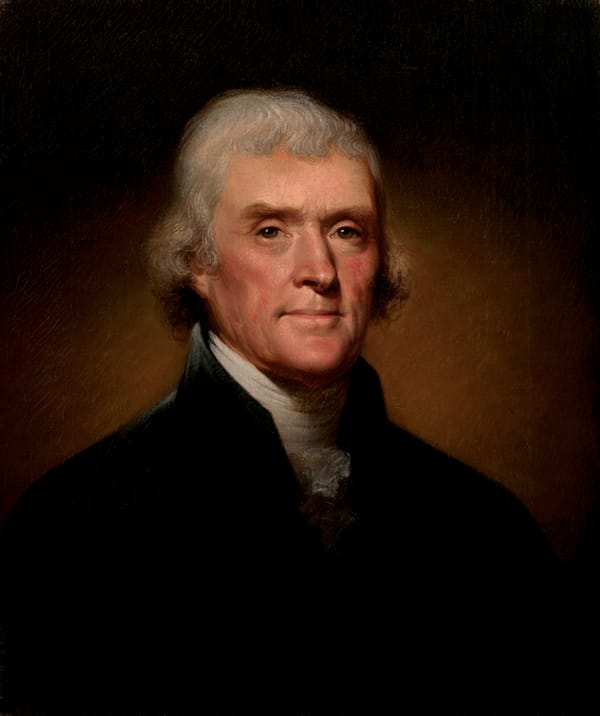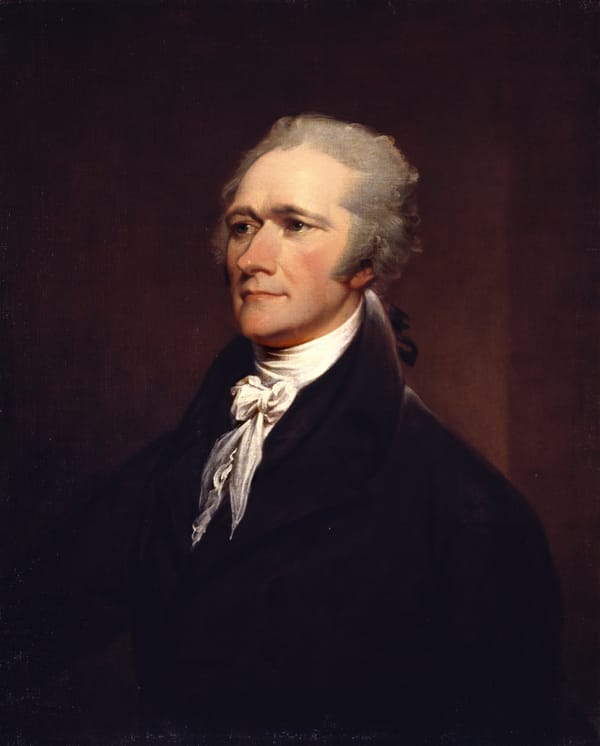Checks and Balances
Happy Constitution Day, y'all (if it is a happy Constitution Day, which I doubt...) and welcome to another installment of Constitutional Perspectives!
Over the last few lessons, I've covered each branch of the federal government in sequence: Congress, the Presidency, and the judiciary. This is a good moment, then, to talk about how the three branches interact. This topic is often referred to as "separation of powers," though in my view "checks and balances" is a better name. True separation of powers, in the style of the great European theorist Montesquieu, is more like what we could call legislative/parliamentary supremacy: basically, all policy-making power is conceived of as legislative, and it must be kept thoroughly separate from anything that isn't the legislature. This would rule out things like the presidential veto and judicial review.
Checks and balances, on the other hand, describes a somewhat messier situation wherein each branch partakes of the others' powers to some degree, and that they are each able to counteract one another in a dynamic and interactive fashion. Those familiar with the Founding-era history probably know that this is a big part of James Madison's whole concept for the federal government, articulated most famously in Federalist Paper No. 51.
Before getting into the powers that each branch has to counteract the others, though, it might be helpful to give a quick sketch of how the branches work together in the ordinary case where everything is going smoothly. A criminal prosecution makes for a neat display. In order for such a prosecution to happen in the first place, Congress has to pass a law making something a criminal offense. Once such a law is in place, the executive – typically through the Department of Justice, not the President personally – is charged with investigating potential violations. When it finds one, it will bring a case in federal court charging the suspect with the crime. The courts then hold a trial, the purpose of which is to ensure that the government has proof that the accused really did the thing, and that the thing in question really did violate the law Congress wrote.
In order for the government to use coercive force, then, the entire government has to operate in concert. Indeed, as Akhil Amar likes to say, if we bring lay juries into the equation then they are six institutions that need to endorse every criminal punishment: the Senate and the House of Representatives (legislative), the President, as represented by DOJ, and the grand jury (executive), and the trial jury along with the professional judges (judicial). That the government does so much business shows that the branches do achieve this level of cooperation an awful lot.
But the story isn't always so simple. If it were, the whole business of constitutionalism would be a lot less interesting. So let's talk about the powers that the different departments have to check one another.
The Judiciary
It makes sense to start with the courts, I think, because in a way their entire function is one of checking the other branches.
Indeed in the scenario I sketched out above, we can already see the way that the courts work to check the executive. The point of a trial is literally to check that the government's claim, that a particular person has committed a particular crime and therefore should be punished according to law, is actually correct! The requirement of criminal prosecution in a court of law, then, becomes a requirement that the executive proceed only according to law, that it can only deploy coercive force insofar as the law allows. For if the government could impose criminal punishments merely upon its own say-so, the existence of any criminal law would allow the executive, if it wanted, to punish anyone for any reason.
This function of the courts is very old – older than America, certainly; older even than our modern notion of constitutionalism. The English law courts played this function for centuries prior to the American Revolution. Perhaps nothing epitomizes the ability of the courts to check the power of the executive like the writ of habeas corpus. This allows anyone held captive (whether by the government or by a private party) to demand that their captor produce a legal justification for their imprisonment. If no such justification is forthcoming, the courts can and will set the petitioner free. Habeas, then, stands as a bulwark against extrajudicial punishment. And, in that capacity, it was regarded, both by the American Founders and by leading British legal theorists, as an essential piece of the overall constitutional scheme, and of any kind of public liberty.
The function of the courts in checking the powers of Congress, on the other hand, is quite a bit more modern. The English law courts had only a very limited ability to check Parliament. They could employ something called equitable interpretation, which means basically that where Parliament passed a statute that the judges really didn't like, they would deliberately give it a very narrow interpretation. But that was it, basically. Parliament could in theory legislate whatever it wanted, and the courts were bound to go along with it.
This changed with the American Constitution, which introduced a novel feature: express legal limits on the authority of Congress! By implication, this was held to give the courts the power to review whether acts of Congress fell within that authority, and to hold void any supposed laws that did not: i.e. the power of judicial review. This is a dramatic, arresting power that the courts have, and you can see how the disciple of Montesquieu I alluded to earlier might think it improper. It is for the legislature to write the laws, after all! When a court invalidates a law, it is performing a legislative function.
I say this not to endorse that criticism of judicial review – on the contrary, I emphatically disagree with it – but just to emphasize the distinctive significance of this particular checking function. Of course I will have lots more to say on the topic of judicial review as this series progresses.
The Presidency
Unlike the courts, we don't mostly think of the President's function as one of checking. No, the President is a doer! They do things, they carry out the laws, fight wars, bring prosecutions, etc.
And yet the President does play a significant role in checking each of the other branches. We can start with what you might call the civics textbook model of these checking powers: the President acts as a check on Congress through the veto, and as a check on the courts by appointing the judges. Both are true and important. But the President's suite of checking powers runs far deeper.
The President can veto a statute, yes. But that only applies at the moment of its passage. What if a new President takes office after, say, a criminal statute they find noxious has already been passed? Well, one option available to them is to grant pardons to everyone who had committed the offense in question, as Thomas Jefferson did with the Sedition Act of 1798 on taking office in 1801. At least for the duration of that presidential term, this nullifies the statute about as effectively as if it had been struck down in court.
Nor is a formal pardon necessarily necessary. The President is the one who, through their subordinates, investigates and prosecutes criminal offenses. If they think a particular law oppressive, they can just... not. Indeed, the President's checking function is kind of implicit in their affirmative function of Doing Things, because they can always just not do the things instead. The President is Commander-in-Chief of the military. This means, among other things, that it is very difficult for Congress to force the President to fight a war they don't want.
This same approach works for the courts, at least in certain permutations of the confrontation. The courts can uphold a law as constitutional, but that doesn't actually force the President to bring prosecutions under that law. It doesn't stop the President from issuing pardons, which may be given for any reason or no reason. In general, courts do not act of their own initiative. They need someone to bring a case first. And the President can just... not do that.
Now, this doesn't work if the President wants to do something that the courts say they can't. In that kind of scenario, because of the rule against extrajudicial punishments, the President's options are limited... sort of. As Hamilton says in Federalist No. 78, the courts don't have any real power. They proclaim, and in ordinary times everyone will respect those proclamations. But their power depends utterly on that respect. In Hamilton's terms, the courts "must ultimately depend upon the aid of the executive arm even for the efficacy of [their] judgments."
A few times in our history, Presidents have flirted with this "just ignore them" approach to checking the courts. It's never really gone their way: it turns out there are really good and important reasons for having everyone listen to the courts. But that option is always out there.
Congress
How can Congress check the other branches? Wrong question. The better one is "how can't Congress check the other branches?"
Again, we can start with the civics textbook model. The great power that Congress has over the other branches is impeachment. Where it finds that any other government official has behaved improperly, it can simply remove them from office. Partly as an implication of the impeachment power, Congress has an oversight function: it can summon government ministers to testify before it and give an account of the running of the government. This is often used to investigate scandals within the executive branch.
Moreover, Congress has the power of the purse. If it does not like what the executive is doing, it can simply decline to fund it, and the Appropriations Clause guarantees that the government cannot spend money without congressional approval. Hell, they can even defund the operation of the courts if they want; the 1802 Supreme Court term was canceled in just this way.
This is already a lot. But I think it vastly understates the power of Congress over the other branches. Most fundamentally, the power that Congress has is the power to write the laws. And since both other branches depend on the laws to give their existence any hint of meaning, this is an almost boundless checking power. The President can act only according to law, in the vast majority of cases, and certainly when trying to deploy coercive force against private individuals. The courts, likewise, are bound to decide cases according to law. And it's Congress that gets to write those laws!
This is, I think, the fundamental reason why Congress is primus inter pares ("first among equals") among the branches. The bottom line is that essentially nothing can happen anywhere within the federal government without its participation in some form. And this means that a sufficiently determined Congress can set right almost any wrong anywhere within the government. This is why I like to say "everything is Congress's fault": because Congress could fix essentially anything it wanted to. Thus, whenever a problem lingers unfixed, it is at least partially Congress's fault.
That's it for checks and balances, at least for now. Next time I'll be talking about the other great overarching structural theme of the Constitution: federalism!

